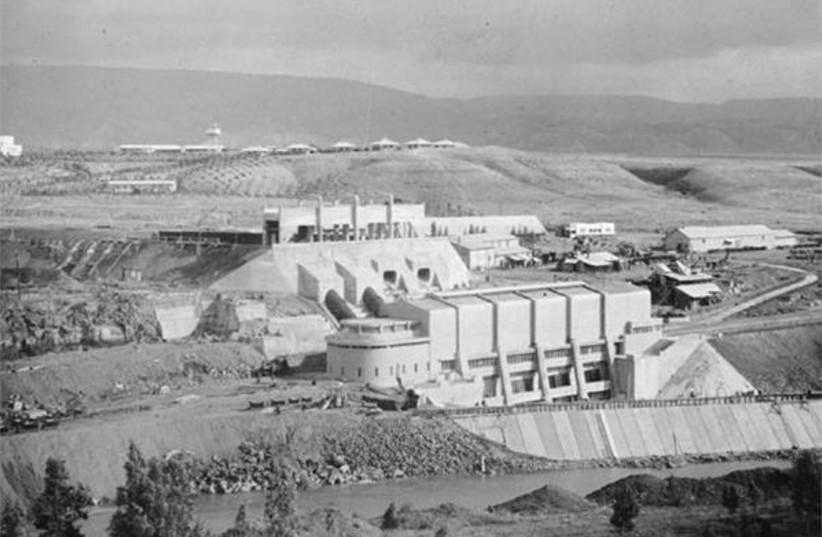When Pinchas Rutenberg, one of the giants of the Zionist movement, died in 1942, his friend writer Moshe Smilansky described him as “a great engineer with the soul of a poet.” Nevertheless, Rutenberg is missing from the public consciousness, even among those who treasure Jewish history. He stipulated in his will that no funds should be collected and no street should be named after him in the Land of Israel.
Leslie Turnberg’s biography An Unreasonable Man: Pinchas Rutenberg, the Russian Revolutionary Who Electrified Palestine is probably the first book in English about this intensely private man who abhorred the limelight.
The life and times of Pinchas Rutenberg
He was born in 1879, the same year as Leon Trotsky, but followed a remarkably different path despite both of them coming from a well-to-do Jewish background. Like many middle-class Jews, Rutenberg began to support the revolutionary cause at a young age and joined the Social Revolutionaries (SRs).
He worked at the Putilov Locomotive and Iron Works in St. Petersburg, organizing workers and meeting Father Gapon, a socially aware priest. At the beginning of 1905, Gapon led a march of multitudes to the Winter Palace to present a petition to the tsar, signed by 150,000 people. At the Putilov Works, all 13,000 workers were on strike and called for an eight-hour day, the ability to organize trade unions, and freedom of the press. Gapon and Rutenberg led the march and were greeted by the rattle of machine-gun fire and a charge of armed Cossacks. What came to be known as “Bloody Sunday” resulted in 500 dead and 3,000 wounded.
Turnberg relates that Gapon and Rutenberg were given shelter by writer Maxim Gorky and that they later escaped to Switzerland, where they met revolutionary figures such as Lenin and Plekhanov. In London, Rutenberg stayed with the famous non-Jewish leader of the Jewish anarchist movement, Rudolf Rocker.

Rutenberg resided in Italy for most of the 1905 Russian Revolution and began to earnestly question the approach of the revolutionaries to the Jewish problem. He met Vladimir Jabotinsky in Brindisi, who had probably also been close to the SRs in his younger years. Together with Jabotinsky and Trumpeldor, who had embarked on the Zionist road, Rutenberg soon became the third member of this acculturated trio of Russian emigrés. During World War I, they collaborated in establishing a Jewish fighting force, the Jewish Legion. As the author implies, all retained a deep love of Russia and Russian culture.
Rutenberg had also been implicated in the hanging of Father Gapon from a clothes hook once the priest had been revealed as working for Tsarist intelligence, the Okhrana, with its policy of “police socialism.” Rutenberg was outraged at being offered a bribe to move over to the dark side.
When the February Revolution broke out in Russia in 1917, its new leader, Aleksandr Kerensky, recalled Rutenberg from Italy and appointed him deputy governor of St. Petersburg. His fortune turned again when Lenin and Trotsky staged a coup d’état a few months later and ushered in the Bolshevik era. Rutenberg was imprisoned, released, and managed to leave Russia when Lenin unleashed the Red Terror upon the SRs and other left-wing opponents.
ONCE IN Palestine, Rutenberg rapidly became a well-known figure in the Yishuv. His passion, however, acquired in Italy, was to develop hydroelectric power for the Middle East. While establishing the Hagana with Jabotinsky, he also browbeat the British into granting him concessions to build power plants in Jaffa and on the River Jordan.
Rutenberg’s brimming confidence and utter determination allowed him to raise considerable sums for his electrification project in the United States and Britain.
Without consulting the Arabs of Palestine, these concessions allowed him to set up plants in Haifa, Jaffa, and Tiberias and to found the Palestine Electric Company in the early 1920s. In 1930, he established a power plant on the Jordan River at Jisr al-Mujamieh/Naharayim.
As Turnberg argues in this book, Rutenberg managed to combine his support for the SRs in revolutionary Russia with his Zionism in Mandatory Palestine. This duality and his sense of privacy allowed him to play a pivotal role in Zionist politics when he attempted to bring David Ben-Gurion and Jabotinsky together. Rutenberg was a socialist who promoted capitalism and refused to join any political party. He advocated for Jewish settlement across the Jordan River while also espousing a bi-nationalist future for Palestine for Jews and Arabs with Judah Magnes and Martin Buber.
Rutenberg was tough and unusual and, as the book’s title suggests, “an unreasonable man” who got things done.
The author, Turnberg, once a professor of medicine, has now taken to writing popular and interesting books about early Zionism. In this noteworthy work, he has reclaimed Rutenberg’s life and times for a wide audience.
- AN UNREASONABLE MAN: PINCHAS RUTENBERG, THE RUSSIAN REVOLUTIONARY WHO ELECTRIFIED PALESTINE
- By Leslie Turnberg
- Matador
- 253 pages; $13
